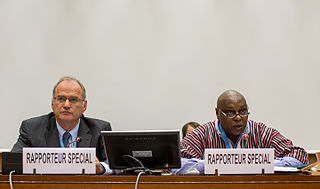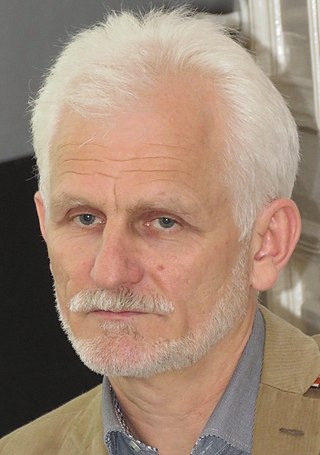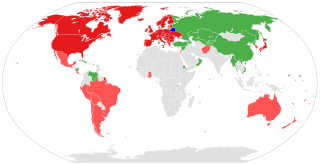Related Research Articles

Belarus, officially the Republic of Belarus, is a landlocked country in Eastern Europe. It is bordered by Russia to the east and northeast, Ukraine to the south, Poland to the west, and Lithuania and Latvia to the northwest. Belarus spans an area of 207,600 square kilometres (80,200 sq mi) with a population of 9.1 million. The country has a hemiboreal climate and is administratively divided into six regions. Minsk is the capital and largest city; it is administered separately as a city with special status.

Belarus elects on national level a head of state—the president—and a legislature. The president is elected for a five-year term by the people. The National Assembly has two chambers. The House of Representatives has 110 members elected in single-seat constituencies elected for a four-year term. The Council of the Republic has 64 members, 56 members indirectly elected and eight members appointed by the president.

Special rapporteur is the title given to independent human rights experts whose expertise is called upon by the United Nations (UN) to report or advise on human rights from a thematic or country-specific perspective.

The State Security Committee of the Republic of Belarus is the national intelligence agency of Belarus. Along with its counterparts in Transnistria and South Ossetia, it kept the unreformed name after declaring independence.

The Constitution of the Republic of Belarus is the supreme basic law of Belarus. The Constitution is composed of a preamble and nine sections divided into 146 articles.

Miklós Haraszti is a Hungarian politician, writer, journalist, human rights advocate and university professor. He served the maximum of two terms as the OSCE Representative on Freedom of the Media from 2004 to 2010. Currently he is adjunct professor at the School of International & Public Affairs of Columbia Law School, New York and visiting professor at the Central European University (CEU), Department of Public Policy.

Mutual relations between the Republic of Belarus and the European Union (EU) were initially established after the European Economic Community recognised Belarusian independence in 1991.

Belarus and Romania officially established diplomatic relations on 14 February 1992. Currently, Belarus has an embassy in Bucharest, while Romania has an embassy in Minsk.

The government of Belarus is criticized for its human rights violations and persecution of non-governmental organisations, independent journalists, national minorities, and opposition politicians. In a testimony to the United States Senate Committee on Foreign Relations, former United States Secretary of State Condoleezza Rice labeled Belarus as one of the world's six "outposts of tyranny". In response, the Belarusian government called the assessment "quite far from reality". During 2020 Belarusian presidential election and protests, the number of political prisoners recognized by Viasna Human Rights Centre rose dramatically to 1062 as of 16 February 2022. Several people died after the use of unlawful and abusive force by law enforcement officials during 2020 protests. According to Amnesty International, the authorities did not investigate violations during protests, but instead harassed those who challenged their version of events. In July 2021, the authorities launched a campaign against the remaining non-governmental organizations, liquidating at least 270 of them by October, including all previously registered human rights organizations in the country.

MikolaViktaravich Statkevich is a Belarusian lieutenant colonel, politician, and opposition leader who was a presidential candidate at the 2010 Belarusian presidential election. Since 31 May 2020 he is held in prison by Belarusian authorities. Viasna Human Rights Centre recognized him as a political prisoner. On 14 December 2021, Statkevich was sentenced to 14 years in prison.

The Belarusian opposition consists of groups and individuals in Belarus seeking to challenge, from 1988 to 1991, the authorities of Soviet Belarus, and since 1995, the leader of the country Alexander Lukashenko, whom supporters of the movement often consider to be a dictator. Supporters of the movement tend to call for a parliamentary democracy based on a Western model, with freedom of speech and political and religious pluralism.

The Viasna Human Rights Centre is a human rights organization based in Minsk, Belarus. The organization aims to provide financial and legal assistance to political prisoners and their families, and was founded in 1996 by activist Ales Bialatski in response to large-scale repression of demonstrations by the government of Alexander Lukashenko.

Ales Viktaravich Bialiatski is a Russian-born Belarusian pro-democracy activist and prisoner of conscience known for his work with the Viasna Human Rights Centre. An activist for Belarusian independence and democracy since the early 1980s, Bialiatski is a founding member of Viasna and the Belarusian Popular Front, serving as leader of the latter from 1996 to 1999. He is also a member of the Coordination Council of the Belarusian opposition. He has been called "a pillar of the human rights movement in Eastern Europe" by The New York Times, and recognised as a prominent pro-democracy activist in Belarus.
Marina Schuster is a German politician of the liberal Free Democratic Party.

Presidential elections were held in Belarus on 11 October 2015. Long-term president Alexander Lukashenko ran for his fifth term in office, having won every presidential election since independence in 1991. He was re-elected with 84% of the vote, according to official figures. The 'against all' option received more votes than any opposition candidate.

Michel Forst is a French national actively involved in the defence of human rights. Former Secretary General of the French national human rights institution, he was the United Nations Special Rapporteur on the situation of human rights defenders from June 2014 to March 2020.
Alena Douhan of Belarus is the United Nations Special Rapporteur on the negative impact of the unilateral coercive measures on the enjoyment of human rights, as 25 March 2020. When appointed, she was a professor of International Law and the Director of the Peace Research Center at the Belarusian State University. Douhan's position on economic sanctions have garnered criticism from some international human rights law scholars.

The 2020–2021 Belarusian protests were a series of mass political demonstrations and protests against the Belarusian government and President Alexander Lukashenko. The largest anti-government protests in the history of Belarus, the demonstrations began in the lead-up to and during the 2020 presidential election, in which Lukashenko sought his sixth term in office. In response to the demonstrations, a number of relatively small pro-government rallies were held.

The following is a list of the official reactions to the 2020 Belarusian presidential election and the surrounding 2020 Belarusian protests.

Mariana Katzarova is a Bulgarian journalist who founded the charity 'RAW on WAR', which created the Anna Politkovskaya Award. She became the first United Nations Special Rapporteur for the Russian Federation in 2023.
References
- 1 2 "Dr Anais Martin". Centre for Civilisation. Retrieved 8 September 2024.
- ↑ "Anaïs Marin « balticworlds.com". balticworlds.com. Retrieved 2024-09-08.
- ↑ "Anais Marin". Chatham House. Retrieved 8 September 2024.
- ↑ "Special Rapporteur on Belarus". OHCHR. Retrieved 8 September 2024.
- ↑ Roth, Andrew (2021-09-06). "Belarus opposition leader jailed in Lukashenko 'purge'". The Guardian. ISSN 0261-3077 . Retrieved 2024-09-08.
- ↑ "UN Rapporteur Says Belarusian Repression Now Worse Than 'Catastrophic'". Radio Free Europe/Radio Liberty. 2021-09-07. Retrieved 2024-09-08.
- ↑ "Report of the Special Rapporteur on the situation of human rights in Belarus, Anaïs Marin". spring96.org. 2024-06-05. Retrieved 2024-09-08.
- ↑ Marin, Anaïs (2022). Belarus: Time for a 'principled' Re-engagement. European Union Institute for Security Studies (EUISS).